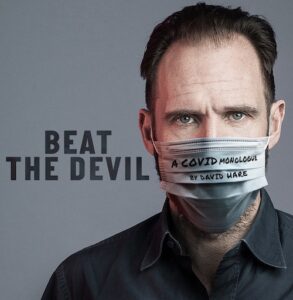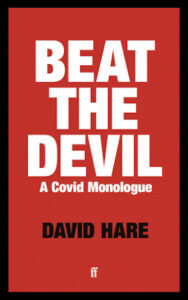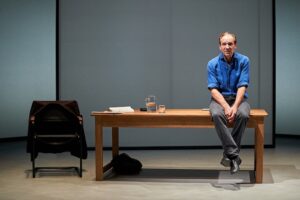Survivor rage
by Mark Reynolds
“This is David Hare at his furious best.” Telegraph
David Hare succumbed to Covid-19 last March, as the UK government continued to dither over following the rest of Europe into lockdown. He contracted it in the confines of a cramped Soho editing room, and was soon experiencing a shortage of breath followed by complex symptoms he describes as “kicking around like I’ve swallowed a Catherine Wheel. I don’t know from day to day what to expect.” His 50-minute ‘Covid Monologue’ Beat the Devil, now performed at London’s Bridge Theatre by Ralph Fiennes, directed by Nicholas Hytner, is a vivid mix of diary and diatribe that paints an engrossing and enlightening picture of his suffering at the hands of both the disease and our flailing leaders.
It feels weird to be entering a theatre again, among a masked-up audience of 250 in a space that normally houses 900, with entire rows and individual seats removed to ensure social distancing. The silence of the faces behind the masks is eerie as we wait for the lights to dim. Then Fiennes emerges from behind a plain screen to a sparse home-office set to inhabit Hare’s frustrations, befuddlement, despair and anger with consummate assurance. Whilst at times Hare’s recap of facts, figures and failures from the early days of lockdown leave the impression of an over-familiar recent news bulletin, the brutal repercussions of a lack of PPE and testing capacity, and the dumping of the unwell from hospitals into hopelessly underequipped care homes, are a stark reminder of what we have all just been through and continue to battle against.
Aside from the ‘official’ symptoms of high temperature, persistent cough, loss of taste and smell and lung damage, sufferers can face sickness and diarrhoea, kidney failure, muscle inflammation, inflammation of the brain, blood clotting: ‘sticky blood’ leading to deep vein thrombosis and pulmonary embolism, and the shutdown of the immune system known as a cytokine storm. “Covid-19 seems to be a sort of dirty bomb, thrown into the body to cause havoc,” Hare muses, while professor Beverley Hunt of King’s College describes the effect as “almost medieval”. Patients and medical experts are equally baffled: “One doctor is quoted as saying, ‘Everyone’s talking about the cytokine storm as if it were a well-recognised phenomenon. Actually, two weeks ago, most doctors had never heard of it.”
Maybe the politicians are inspired by the medicine. After all, if our vital signs have decided that now is the time to lie to us, maybe our government has decided the same.”
Johnson’s press allies claim the PM’s critics are enjoying the benefit of hindsight. “Not me,” Hare insists. “From the moment the pandemic was headed this way, the prime minister scares me because I keep thinking, ‘Johnson doesn’t seem on top of this.’”
At his worst, Hare was assaulted by fever, conjunctivitis, coughing, diarrhoea and even herpes. “Just as my illness enters its mad phase,” he reflects, “so does the Conservative government… Maybe the politicians are inspired by the medicine. After all, if our vital signs have decided that now is the time to lie to us, maybe our government has decided the same… Nothing makes sense. At this point, I’m not sure whether to put this down to my delirium or theirs.”
After 16 days of exhaustion, despair and general unwellness suddenly lift, “like a demon leaving your body”, Hare is filled with righteous anger: “I don’t have survivor’s guilt, I have survivor’s rage.” As minister after minister stumbles over the garbled messaging of the daily public briefings, he seethes, “people complain that this is a cabinet of mediocrities. But this does violence to the word. Mediocrity suggests middling ability…. These people are incompetents.”
Robert Jenrick, Dominic Raab and Minister for Care Helen Whately, “who comes across like a quiz contestant who’s forgotten the name of the fourth Beatle”, are each named and shamed, but his deepest ire is reserved for Boris Johnson, Priti Patel and Matt Hancock, who led the cheering when nurses were refused a proper pay rise back in June 2017 and now have the brass neck to extol the “heroes” of the beleaguered NHS.
Quoting former Chief Medical Officer Liam Donaldson: “To err is human, to cover up is unforgivable and to fail to learn is inexcusable,” Hare ponders, “Is the labour of lying really worth the effort? Isn’t it draining on everyone’s ingenuity, conscience and resources?… Does it never occur to the great minds of British politics that there is a direct connection between honesty and popularity? Why is that idea so hard to grasp?”
As lockdown begins to lift, 1922 Committee chairman Graham Brady “tells the public ‘they’re a little too willing to stay at home.’ Conservative MPs are settling back into their comfort zone, making their timeless complaint that the public are once more letting the politicians down.”
Whilst remaining weak and in recovery, Hare is surprised by new feelings of joy and sensitivity in his everyday life: “I am startled to come out of this experience a hippy.” But in the light of the Johnson government’s litany of failures, he clearly has more than just Covid in sight when he vows, “by doing the simple things right, my plan is to beat the devil.”
David Hare is one of the UK’s most prolific and acclaimed writers, having written extensively for stage, television and film. He is the author of over 30 full-length plays; his first, Slag, was produced in 1970. He is the winner of multiple international awards including a BAFTA for Licking Hitler, an Olivier award and a Critics’ Circle award for Racing Demon, an Evening Standard Drama award for Pravda and a Tony Award for Skylight. He is also a two-time Academy Award nominee for The Hours and The Reader and was knighted in 1998.
 Ralph Fiennes has enjoyed an extensive career in theatre, film and television as well as producing and directing film. Beat the Devil marks his debut at the Bridge Theatre. His forthcoming films include The King’s Man, The Dig, The Forgiven and No Time To Die.
Ralph Fiennes has enjoyed an extensive career in theatre, film and television as well as producing and directing film. Beat the Devil marks his debut at the Bridge Theatre. His forthcoming films include The King’s Man, The Dig, The Forgiven and No Time To Die.
Ralph Fiennes – IMDb
Nicholas Hytner co-founded the London Theatre Company with Nick Starr in 2017 to develop and operate the Bridge Theatre. At the Bridge he has directed Young Marx, Julius Caesar, Allelujah!, Alys, Always, A Midsummer Night’s Dream and Two Ladies. Previously he was Director of the National Theatre from 2003 to 2015. His memoir Balancing Acts, a Sunday Times bestseller, is published by Vintage.
Read more
Beat the Devil continues in a repertoire of twelve one-person plays at the Bridge Theatre to 31 October. The run is sold out, but a limited number of Day Tickets are available on the day of each production from 10 am.
More info
The playscript is published in paperback and eBook by Faber & Faber.
Read more
Mark Reynolds is a freelance editor and writer, and a founding editor of Bookanista.
@bookanista
wearebookanista
bookanista.com/author/mark


